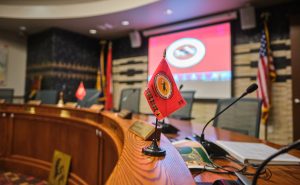By the CUJ
SHELTON, Wash. – Members of the Youth Leadership Council of the Confederated Tribes of the Umatilla Indian Reservation (CTUIR) attended the annual Salmon Orca Summit held July 7-8.
“Our young People are excited to be here to listen and to stand united in supporting investment in salmon and river restoration in the Northwest and throughout Indian Country,” said Julie Taylor, Director of the CTUIR Department of Children and Family Services and Youth Council Advisor, in a Facebook post. “Proud of these young people taking these opportunities to represent and educating oneself to preserve their traditions and culture.”
According to the Salmon and Orca Summit website, the purpose of the summit is to allow for advocates and allies to stand in solidarity with the Tribes and to support the protection and restoration of endangered salmon populations in the Snake River and across the Northwest, as well as recovering Southern Resident orcas.
In attendance with the youth council was CTUIR BOT Vice Chair Jeremy Wolf, CTUIR BOT Member Cor Sams, CTUIR Staff Brent Hall and Chaperone Cara Greene.
Wolf was the first of several tribal leaders to speak at the summit.
“For thousands of years, salmon thrived in the Columbia Basin,” he said. “We had plenty of salmon to sustain us, and plenty more to trade with others from far away. Salmon has been a source of sustenance, a gift, a religion, a foundation of culture for our people since time immemorial. Their existence is vital and linked to ours. We can save salmon and make the economy of the Pacific Northwest even stronger.”
The event, held in the traditional homelands of the Squaxin Island Tribe, was hosted by the Nez Perce Tribe and the Affiliated Tribes of Northwest Indians. According to organizers, it represents “hope, opportunity, and a chance for real solutions.”
In May, ATNI passed a resolution calling on President Biden and Congress to “seize a once-in-a-lifetime congressional opportunity to invest in salmon and river restoration in the Pacific Northwest, charting a stronger, better future for the Northwest, and bringing long-ignored tribal justice to our peoples and homelands. The fate of our Tribes and the Northwest salmon are intertwined.”



